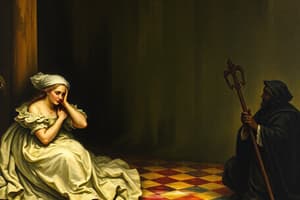Podcast
Questions and Answers
Macbeth believes he is invulnerable due to the witches' prophecy.
Macbeth believes he is invulnerable due to the witches' prophecy.
True (A)
Macbeth is killed by Malcolm, who restores order at the end of the play.
Macbeth is killed by Malcolm, who restores order at the end of the play.
False (B)
The appearance of Macbeth's kingship is revealed to be based on truth and justice.
The appearance of Macbeth's kingship is revealed to be based on truth and justice.
False (B)
Lady Macbeth's psychological collapse is a key element in the theme of appearance versus reality.
Lady Macbeth's psychological collapse is a key element in the theme of appearance versus reality.
Shakespeare suggests that illusions can sustain a ruler's power indefinitely.
Shakespeare suggests that illusions can sustain a ruler's power indefinitely.
Lady Macbeth's soliloquy demonstrates her desire to embrace her feminine qualities.
Lady Macbeth's soliloquy demonstrates her desire to embrace her feminine qualities.
Banquo's character contrasts with Macbeth by remaining morally steadfast and not succumbing to ambition.
Banquo's character contrasts with Macbeth by remaining morally steadfast and not succumbing to ambition.
Lady Macbeth shows no remorse for her actions throughout the play.
Lady Macbeth shows no remorse for her actions throughout the play.
Banquo’s ghost appearing at the banquet represents Macbeth's guilt and psychological turmoil.
Banquo’s ghost appearing at the banquet represents Macbeth's guilt and psychological turmoil.
Macbeth believes he is invincible due to the witches' prophecies until the very end of the play.
Macbeth believes he is invincible due to the witches' prophecies until the very end of the play.
The tension between appearance and reality is a minor theme throughout the play.
The tension between appearance and reality is a minor theme throughout the play.
Lady Macbeth's power and resolve ultimately lead to her mental breakdown.
Lady Macbeth's power and resolve ultimately lead to her mental breakdown.
The final prophecy states that Macbeth will be defeated by someone who was born of woman.
The final prophecy states that Macbeth will be defeated by someone who was born of woman.
The witches in Macbeth provide clear and truthful prophecies.
The witches in Macbeth provide clear and truthful prophecies.
The theme of appearance versus reality is central to the conflict in Macbeth.
The theme of appearance versus reality is central to the conflict in Macbeth.
Macbeth interprets the witches' prophecies with a clear understanding of the consequences.
Macbeth interprets the witches' prophecies with a clear understanding of the consequences.
The statement 'Fair is foul, and foul is fair' reflects the theme of moral clarity in Macbeth.
The statement 'Fair is foul, and foul is fair' reflects the theme of moral clarity in Macbeth.
Macbeth's ambition leads him to clarity and truth.
Macbeth's ambition leads him to clarity and truth.
The witches' language in Macbeth is straightforward and unambiguous.
The witches' language in Macbeth is straightforward and unambiguous.
Appearance versus reality in Macbeth affects both internal and external conflicts.
Appearance versus reality in Macbeth affects both internal and external conflicts.
Macbeth's belief in the witches' prophecies leads him to a clear understanding of his fate.
Macbeth's belief in the witches' prophecies leads him to a clear understanding of his fate.
Macbeth is initially depicted as an untrustworthy character who seeks power at any cost.
Macbeth is initially depicted as an untrustworthy character who seeks power at any cost.
The first instance of Macbeth's deceit occurs when he considers the murder of King Duncan.
The first instance of Macbeth's deceit occurs when he considers the murder of King Duncan.
Lady Macbeth encourages Macbeth to follow through with his hesitations about murdering Duncan.
Lady Macbeth encourages Macbeth to follow through with his hesitations about murdering Duncan.
After killing Duncan, Macbeth openly admits his guilt to the court.
After killing Duncan, Macbeth openly admits his guilt to the court.
Macbeth becomes increasingly paranoid about Banquo's descendants after taking the throne.
Macbeth becomes increasingly paranoid about Banquo's descendants after taking the throne.
Lady Macbeth also struggles with guilt and paranoia after the murder of Duncan.
Lady Macbeth also struggles with guilt and paranoia after the murder of Duncan.
Macbeth feels he has completely succeeded in his goals after he orders the massacre of Macduff's family.
Macbeth feels he has completely succeeded in his goals after he orders the massacre of Macduff's family.
The theme of appearance versus reality is primarily concerned with the notion of strength and control.
The theme of appearance versus reality is primarily concerned with the notion of strength and control.
Flashcards
Appearance vs. Reality
Appearance vs. Reality
The difference between how something seems and what it truly is.
Duplicity
Duplicity
Characters in Macbeth use deception to gain power or hide their true intentions.
Deceptive Reign
Deceptive Reign
Macbeth's reign built on violence and paranoia is exposed as false and ultimately leads to his downfall.
Consequences of Deception
Consequences of Deception
Signup and view all the flashcards
Triumph of Reality
Triumph of Reality
Signup and view all the flashcards
Macbeth's initial presentation
Macbeth's initial presentation
Signup and view all the flashcards
Macbeth's internal conflict
Macbeth's internal conflict
Signup and view all the flashcards
Macbeth's facade as a king
Macbeth's facade as a king
Signup and view all the flashcards
Macbeth's paranoia
Macbeth's paranoia
Signup and view all the flashcards
Macbeth's continued deception
Macbeth's continued deception
Signup and view all the flashcards
Macbeth's complete embrace of deceit
Macbeth's complete embrace of deceit
Signup and view all the flashcards
Lady Macbeth's influence
Lady Macbeth's influence
Signup and view all the flashcards
Lady Macbeth's appearance vs. reality
Lady Macbeth's appearance vs. reality
Signup and view all the flashcards
Lady Macbeth's Deception
Lady Macbeth's Deception
Signup and view all the flashcards
Sleepwalking Scene
Sleepwalking Scene
Signup and view all the flashcards
Banquo's Integrity
Banquo's Integrity
Signup and view all the flashcards
Banquo's Murder
Banquo's Murder
Signup and view all the flashcards
Banquo's Ghost
Banquo's Ghost
Signup and view all the flashcards
Macbeth's Demise
Macbeth's Demise
Signup and view all the flashcards
Central Theme
Central Theme
Signup and view all the flashcards
The Witches' Role
The Witches' Role
Signup and view all the flashcards
Half-Truths and Manipulation
Half-Truths and Manipulation
Signup and view all the flashcards
Paradoxical Language
Paradoxical Language
Signup and view all the flashcards
Macbeth's Misinterpretation
Macbeth's Misinterpretation
Signup and view all the flashcards
Descent into Deception
Descent into Deception
Signup and view all the flashcards
Study Notes
Macbeth: Appearance vs. Reality
- Themes: The play explores themes of ambition, power, the destructive nature of ambition, and the corrupting influence of power. Appearance versus reality is central.
- Characters Often Not What They Seem: Characters often behave in ways that aren't genuine, masking their true motives to achieve their goals. Dishonesty and duplicity are common.
- Witches' Prophecies: The witches' prophecies use riddles and paradoxical language, leading Macbeth astray by blurring the lines between truth and deception.
- Paradoxical Language: The phrase "Fair is foul, and foul is fair" exemplifies the play's use of paradox to create an atmosphere of uncertainty and confusion.
- Macbeth's Deception: Macbeth's ambition causes him to mask his true nature, leading to disastrous consequences. He initially portrays a loyal subject, but internally struggles with the morality of murder.
- Lady Macbeth's Deception: Lady Macbeth initially appears strong and ruthless, but her sleepwalking scene exposes her inner turmoil and guilt following Duncan's murder. Both characters prioritize appearances over inner truthfulness and morality.
- Banquo's Innocence: Banquo acts as a foil to Macbeth, remaining morally steadfast and not succumbing to the witches' deceitful prophecies. He maintains an appearance of innocence despite facing similar threats.
- The Collapse of Appearances: Macbeth's reign, built on deceit and murder, ultimately fails. The truth of his actions are revealed, leading to his downfall. The restoration of order depicts that appearance cannot sustain itself forever.
- Consequences of Deception: The play highlights the destructive nature of falsehood and the impossibility of maintaining a false persona for a prolonged period.
Studying That Suits You
Use AI to generate personalized quizzes and flashcards to suit your learning preferences.




